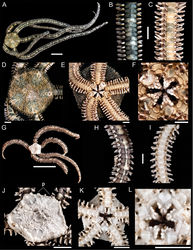Ophiophragmus papillatus
| Notice: | This page is derived from the original publication listed below, whose author(s) should always be credited. Further contributors may edit and improve the content of this page and, consequently, need to be credited as well (see page history). Any assessment of factual correctness requires a careful review of the original article as well as of subsequent contributions.
If you are uncertain whether your planned contribution is correct or not, we suggest that you use the associated discussion page instead of editing the page directly. This page should be cited as follows (rationale):
Citation formats to copy and paste
BibTeX: @article{Granja–Fernández2014ZooKeys406, RIS/ Endnote: TY - JOUR Wikipedia/ Citizendium: <ref name="Granja–Fernández2014ZooKeys406">{{Citation See also the citation download page at the journal. |
Genus: Ophiophragmus
Name
Ophiophragmus papillatus Ziesenhenne, 1940 – Wikispecies link – Pensoft Profile
Description
Disk rounded (dd = 1.7 to 2.7 mm). Disk covered with small and imbricated scales. There is a central primary plate surrounded by five separated smaller scales. There are a few blunt papillae in the center of the disk. The disk margin is composed of small and rounded papillae. Radial shields separated proximally by two large scales and distally in contact (Fig. 1J).Ventral side of the disk covered by imbricated and finer scales than those on the dorsal side (Fig. 1K). Oral shields diamond-shaped. Adoral shields meeting within. Three rounded oral papillae on each side of the jaw, apical papillae the largest and thickest. Four teeth (Fig. 1L). Dorsal arm plates rounded, wider than long (Fig. 1H). Ventral arm plates quadrangular with rounded margins, wider than long. Three blunt, thick and small arm spines; upper spine is the most robust. Two small tentacle scales perpendicular to each other (Fig. 1I). Dorsal side of the disk creamy-white. Dorsal arm plates brown with black spots, and with a creamy middle longitudinal line along the arms (Fig. 1G, H). Ventral side uniformly creamy-white (Fig. 1K).
Distribution
Tangola Island, Tangola-Tangola Bay, Oaxaca, Mexico (Station 260–34) (Ziesenhenne 1940[1]). In this study, Ophiophragmus papillatus was collected on coral reefs from Guerrero and Oaxaca at a depth of 6.4 m.
Remarks
The collection of Ophiophragmus papillatus in La Mina, Oaxaca and Palmitas, Guerrero is remarkable because the species had not been reported since its description by Ziesenhenne in 1940. This study reports a range extension of almost 410 km north of the type locality (Tangolunda, Mexico). We collected three organisms which perfectly match the original description provided by Ziesenhenne (1940)[1]. These specimens have a similar disk diameter to the holotype, which is 3.6 mm (Ziesenhenne 1940[1]); the specimen from Palmitas has a disk diameter of 2.7 mm, whereas the specimens from La Mina have disk diameters of 1.7 mm and 2.4 mm. The two smaller specimens presented the color pattern mentioned in the description but the brown color of the dorsal arm plates was less evident than in the largest specimen. Ophiophragmus papillatus was collected in rock and coral. Other members of the genus Ophiophragmus inhabit sand, soft mud, rock, seagrass, mangroves and reefs (Nielsen 1932[2], Hendler et al. 1995[3]). Ophiophragmus papillatus is a new record distribution for the state of Guerrero.
Collected material
GUERRERO: Palmitas (1 specimen, rock, 6.4 m, 20/11/2011, ICML-UNAM 10448).
OAXACA: La Mina (2 specimens, coral, 19/02/2009, ICML-UNAM 10583).
Taxon Treatment
- Granja–Fernández, R; Herrero-Pérezrul, M; López-Pérez, R; Hernández, L; Rodríguez-Zaragoza, F; Jones, R; Pineda-López, R; 2014: Ophiuroidea (Echinodermata) from coral reefs in the Mexican Pacific ZooKeys, 406: 101-145. doi
Other References
- ↑ 1.0 1.1 1.2 Ziesenhenne F (1940) New Ophiurans of the Allan Hancock Pacific Expeditions. Allan Hancock Pacific Expeditions 8(2): 9-52.
- ↑ Nielsen E (1932) Ophiurans from the Gulf of Panama, California, and the Strait of Georgia. Videnskabelige Meddelelser fra Dansk Naturhistorisk Forening 91: 241-346.
- ↑ Hendler G, Miller J, Pawson D, Kier P (1995) Sea stars, sea urchins, and allies. Echinoderms of Florida and the Caribbean. Smithsonian Institution, Hong Kong, 390 pp.
Images
|
